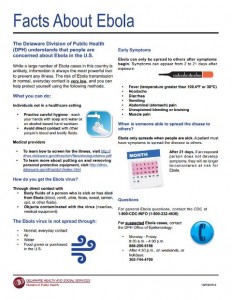
Dear Delawarean,
Because of the diagnosis of individuals in Dallas with Ebola virus and the subsequent intense media coverage, I know that people are concerned. As Delaware’s State Health Officer, I want to help Delawareans separate the facts from fiction and to know what is being done in Delaware in the event that we have the Ebola virus in our state. And I want people to know where to turn if they have concerns or questions.
The tragic epidemic of the Ebola virus infection in West Africa continues to unfold. Particularly affected are the countries of Liberia, Guinea, and Sierra Leone. Recently, the Ebola virus was transmitted to two nurses from an ill Liberian man in Dallas, Texas. The man subsequently passed away, and the nurses are still hospitalized. The two women contracted the illness due to a combination of direct contact with a severely ill individual and a presumed break in hospital personal protection measures. None of the community contacts of the man who passed away in Dallas became ill, including his family and friends. The other health care workers who treated him are still under observation and will remain so until the 21-day incubation period passes.
Based on currently available information, Ebola virus is only transmitted by patients who have symptoms and the risk of getting the disease through normal, everyday contact is very low. The people being monitored by health officials in other states who came into brief contact with the three ill people in Texas or on an airplane are being monitored as an extra precaution, not because there is a high risk of a genuine large spread of the illness. And, the close family and friends of the man who passed away in Texas were just released from monitoring as the incubation period has passed and no one became ill.
As you move through your day, remember this virus, and many other viruses, can be killed through careful hand washing and alcohol-based sanitizers.
To become ill with Ebola, a person must come into direct contact with blood or bodily fluids of an infected individual. Symptoms of Ebola occur after an incubation period of two to 21 days and include:
- Fever (temperature greater than 100.4°F or 38°C)
- Headache
- Diarrhea
- Vomitting
- Abdominal (stomach) pain
- Unexplained bleeding or bruising
- Muscle pain
The Delaware Division of Public Health (DPH) has been actively preparing for a potential Ebola illness in Delaware. While the risk is low for Delaware, it is important to be prepared for any situation. DPH has been working with medical providers, hospitals, some employers, EMS, and other partners to ensure they are ready. DPH is particularly focused on ensuring medical partners can immediately recognize a potential case and handle the patient appropriately.
All Delaware hospitals have confirmed the ability to manage Ebola patients. That means they have put in place plans to isolate patients with Ebola, and are training on practices to protect health care workers. If a case is confirmed in Delaware, a Centers for Disease Control and Prevention (CDC) special team will immediately be placed on the ground to help DPH trace any potential contacts whom may also need to be isolated and help to determine if the ill patient should be moved out of state for treatment.
I know Delawareans have questions about what they should do if they suspect a person they encounter might be infected with Ebola virus. First, it is important that we don’t make assumptions that someone might be infected based on their accent, background or skin color, and it is important to remember how hard the disease is to get.
If you or a loved one start to show symptoms you find concerning, call your health care provider. Flu season has started in Delaware. Flu and several travel-related illnesses including malaria, typhoid fever and dengue are much more common than Ebola. The symptoms of all these diseases are very similar.
If you wish to discuss a suspected case, you may contact DPH at 888-295-5156 Monday – Friday: 8:30 a.m. – 4:30 p.m. or 302-744-4700 after 4:30 p.m., weekends, and holidays. If you have general questions, the CDC has a 24/7 line available for general questions on the Ebola virus and can be reached by calling 1-800-CDC-INFO (800-232-4636).
I hope I have helped to address concerns you may have. The attached Ebola Fact Sheet (PDF) is provided for further information.
Karyl Rattay, MD, MS
Director
Delaware Public Health
Department of Health and Social Services